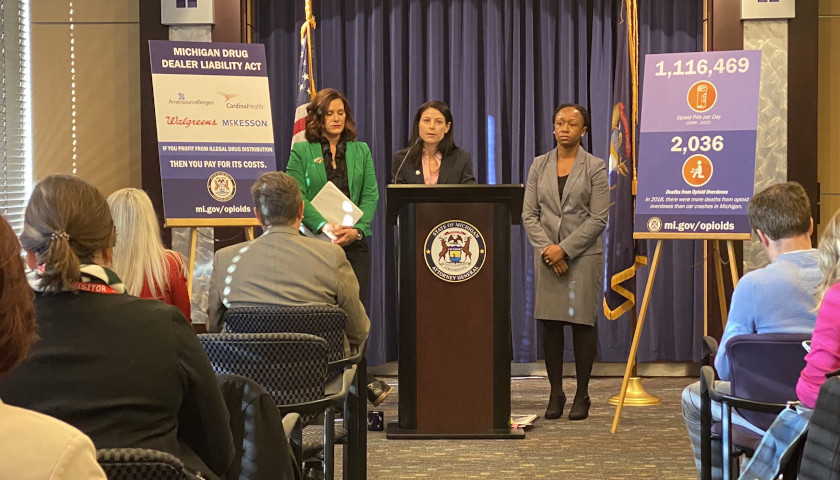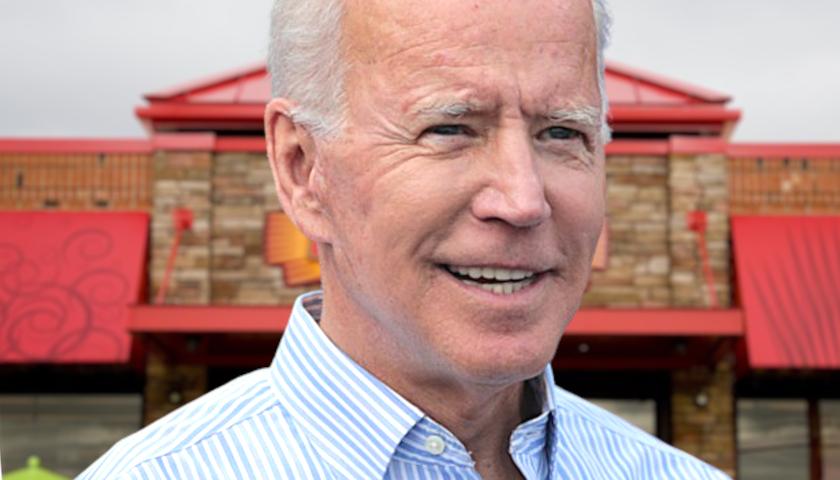Michigan became the first state in the nation to sue major opioid distributors as drug dealers because they “knowingly participated in the illegal distribution of the prescription opioids purchased by Michigan residents.”
The lawsuit was filed Tuesday morning in Wayne County Circuit Court against Cardinal Health Inc., McKesson Corporation, AmerisourceBergen Drug Corporation, and Walgreens. In announcing the complaint, Attorney General Dana Nessel said these companies “knowingly and deliberately used their licenses to distribute drugs in our state without controls.”
“This was not only negligent; it was unlawful, a public nuisance and, as a result, their actions subject these companies to liability under Michigan’s Drug Dealer Liability Act,” Nessel said in a statement.
Gov. Gretchen Whitmer joined Nessel in announcing the “historic litigation,” which accuses the four companies of distributing and selling opioids in a way that facilitated and encouraged their “flow into the illegal, secondary market.”
“The opioid crisis is hurting families from Downtown Detroit all the way to the Upper Peninsula, which is why last month, I announced a statewide goal for the State of Michigan to reduce the number of opioid deaths by 50 percent in 5 years,” said Governor Whitmer. “The work Attorney General Nessel’s office is doing will be crucial in us reaching that goal. I applaud the Attorney General for her leadership and will continue to work closely with her and everyone else who wants to help Michiganders struggling with opioid use disorder and their families.”
Dr. Joneigh Khaldun, the chief medical executive for the Michigan Department of Health and Human Services, said the state “lost more than 2,000 Michiganders to opioid overdoses” in 2018, which is more than five people per day.
“The actions being taken by the Attorney General today will help ensure that those who contributed to the crisis bear responsibility and bring desperately needed resources into the state to save the lives of those caught in the crisis today,” she said.
“Today should be known as the day that Michigan decided to fight back.” @MIAttyGen @dananessel on announcing a critical step in combating the opioid epidemic with @GovWhitmer & @DrKhaldun pic.twitter.com/XjW8e98yx2
— Michigan Attorney General (@MIAttyGen) December 17, 2019
According to Nessel, Michigan experienced 2,599 drug overdose deaths in 2018, 2,036 of which were opioid-related.
“Michigan’s opioid addiction crisis and the devastation it has wrought on families, communities and our state demanded our attention when the Governor and I took office nearly a year ago,” Nessel added.
The lawsuit accuses the four companies of distributing and selling opioids without maintaining effective controls against the diversion of opioids. The complaint says the opioid distributors choose not to effectively monitor suspicious orders, investigate suspicious orders, report suspicious orders, or stop and suspend shipments of suspicious orders.
As such, the lawsuit argues that the companies are liable to the state of Michigan under the Drug Dealer Liability Act for damages caused by the opioid crisis. These damages include costs borne by the state for increased law enforcement, health care, rehabilitation, early childhood intervention, prosecution and courtroom expenses, additional jail space, and drug treatment programs.
“As distributors of controlled substances, Defendants have special responsibilities to ensure that those drugs did not get into the wrong hands, and to protect the Michigan communities those companies purport to serve. Despite having these responsibilities, and despite having unique knowledge of and access to data and other information to help them fulfill those responsibilities, Defendants failed to maintain effective controls over the diversion of prescription opioids,” the lawsuit states.
“Instead, Defendants distributed and sold far greater quantities of prescription opioids than they knew could be necessary for legitimate medical uses, while failing to report, and to take steps to halt, suspicious orders when they were identified. As a direct result of their conduct, Michigan has experienced both a flood of prescription opioids available for illicit use or sale and a population of patients physically and psychologically dependent on them,” it continues.
Attorney General Nessel concluded her remarks by declaring that the opioid epidemic “continues to be fed by these companies precisely because the fines and suspensions imposed by the DEA did nothing to change their business practices.”
“McKesson, Cardinal, AmerisourceBergen and Walgreens all paid millions of dollars in fines as a cost of doing business in an industry that generates billions of dollars in annual revenue,” said Nessel. “That is why today will not simply be known as the day Michigan decided to file a lawsuit; instead, today will known as the day that Michigan started to fight back.”
– – –
Anthony Gockowski is managing editor of Battleground State News, The Ohio Star, and The Minnesota Sun. Follow Anthony on Twitter. Email tips to [email protected].
Photo “Dana Nessel” by Dana Nessel.





